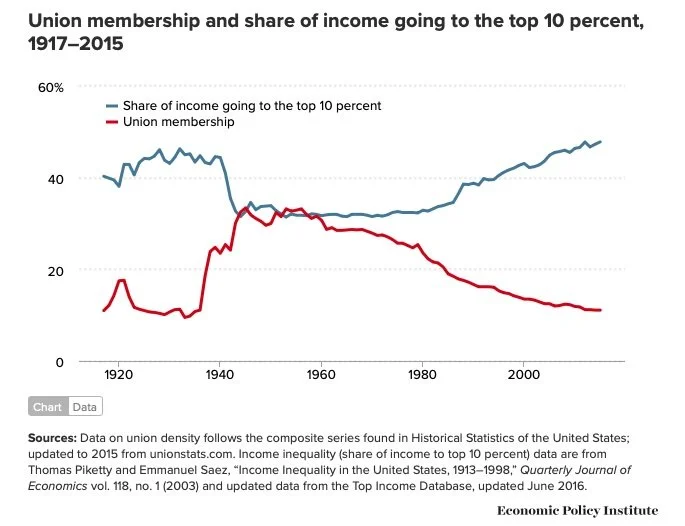What If Workers Could Hire and Fire Managers?
I could write a long post that lays out how the world of work has become ever more exploitative in recent decades, throughout my professional lifetime. i’m not going to do all that. Others have done it better, but I will highlight a couple of things before getting to my main point, and the point of the excellent video essay shown at the end of this post.
First, when I was a student at Wharton as an undergrad in 1985, I was taught that as worker productivity increased, so too did worker pay. And that was mostly true in the US before 1980, at which point the Reagan revolution took hold and rebalanced social and economic power away from workers and began the dismantling of the New Deal:
There are a lot of political and policy factors that changed this, including tax policy. Another huge factor has been the decline of union membership, something the Reagan revolution intentionally targeted as a desired outcome of its policy agenda. This was dramatically illustrated by Reagan busting the air traffic controllers union. Take a look at union membership rates and the timeline below, and how that coincides with the reduced share of wealth “trickling” down to the workers who produce the wealth:
So, when workers had more collective power and leverage to shape the decision making within corporations for how profits would be distributed, they saw more or less commensurate gains compared to managers and stockholders. As that leverage and collective power was attacked and dismantled, income inequality and workplace totalitarianism skyrocketed to levels still ascending today. Corporations are engaged in more employee monitoring and privacy invasion than ever before, all in an effort to assert more control over human beings as assets, as rented properties. Return to office mandates are not about productivity, they are about control, and secondarily about coercing people to quit in order toredcuce labor costs through a backdoor layoff initiative.
None of this is inevitable. All of this is the result of choices made by society, choices that can be reviewed, discussed, revised and undone. These are systems we as humans create. There is no natural law or invisible hand that creates all this. We are the invisible hand, though all the concentrated wealth and resources in the world invest heavily in the control and dissemination of knowledge and information flow to eliminate any budding consciousness of these facts. It is possible to build successful - very successful - businesses where managers and leaders are elected by employee owners of the companies. They already exist. Once such model is the worker cooperative.
Worker ownership solves for the principal-agent problem in corporate ownership. Briefly stated, the people who effectively own and make decisions about corporations and how they operate know the least about the inner workings of the businesses and have no direct awareness of or care about the impacts of their decisions at the local level or even global level. These agents to whom decision making authority is effectively delegated maximize their own interests at the expense of principal stakeholders. Private equity, hedge funds, large investment groups that manage ETFs, these are the entities whose interests monopolize decisions making, They are the agents, but not the principals stakeholders, who include customers, workers, and the society at large or general community welfare.
So, for example, sprawing AI server farms are built that consume inordinate amounts of energy while accelerating climate change and contaminating water supplies in the places where they are built, and then the AI in turn displaces workers and dumbs down the information ecosystem with great floods of “hallucinatory” content, otherwise known as slop or bullshit. The real winners here are scammers. This then makes it ever more difficult for societies to make decisions because people cannot obtain reliable information to form common ground for discussion and solution building. But hey, in the short term, older, wealthier people (and their heirs) become wealthier still and can buy private security, media empires and surveillance technology to protect them from the risk of change. The ones making the decisions won’t live long enough to see the full effects of climate catastrophe, so what do they care?
There are alternatives. Worker owned organizations are more efficient that the dominant external shareholder and managerial class model because they are more innovative due to workers having a genuine stake and reward for improving business. They are the ones who can see directly what can improve because they are closet to the actual work. They are also more efficient because they do not so easily exclude the local or externalized impacts of businesses on lived communities and people’s lives. They create more balanced wealth and prosperity and thereby improve people’s lives. Their structures include built in checks against the endless cycle of worker exploitation that the new aristocracy of corporate owners and executives sustain to maintain control over the majority of the world’s population, including through influence over governments through donations, corruption, and kickbacks.
If you’re curious to learn more about all this, check out the video to the right. The first step in change is to become aware of what’s possible..

